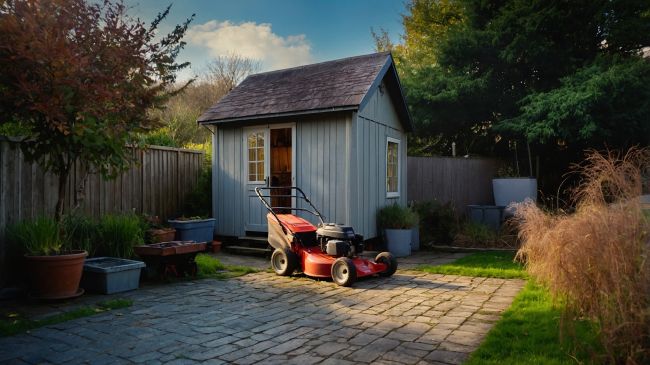How to Prepare Your Garden Machinery for Winter Storage

As autumn draws to a close, most of us gardeners start winding down for winter. But before you shut the shed door for the season, it’s time to give your garden tools and machinery a bit of attention.
Taking an hour or two now to properly clean, service, and store your tools can make all the difference when spring rolls around. Come March, you’ll start the season with reliable, easy-starting equipment instead of a rusty mower that stubbornly refuses to spark to life.
Here’s how to get your garden machinery ready for hibernation – and why it’s one of the best investments you can make in your tools’ long-term health.
Step 1: Give Everything a Good Clean
Before putting anything away, get rid of the dirt, grass clippings, and sap that build up over the season. Left unchecked, moisture and that organic debris can lead to rust, corrosion and blockages. Here are some specifics:
- Mowers & strimmers – Scrape away dried grass from underneath the deck and around the blades. A stiff brush and a mild detergent usually do the trick.
- Chainsaws & hedge trimmers – Use a soft brush or a can of compressed air to remove sawdust and debris from around the chain, vents and motor housing.
- Blowers & vacuums – Check the tubes and impeller area for trapped leaves or twigs that could block airflow.
Cleaning isn’t just cosmetic – it helps you spot worn or damaged parts early, and prevents leftover dirt from attracting moisture during storage.
Step 2: Drain or Stabilise the Fuel
One of the most common causes of engine trouble in spring is stale fuel. Modern petrol blends degrade surprisingly quickly, leaving behind sticky residue that clogs carburettors and fuel lines.
For petrol-powered tools, you have two good options:
- Run them dry – Empty the tank, then start the engine and let it run until it stops naturally. This clears any fuel from the system.
- Add a stabiliser – If you’d rather keep some fuel in the tank, mix in a quality stabiliser to prevent oxidation and gumming.
Battery-powered tools are simpler – just make sure to fully charge and then partially discharge (around 50%) before storing the battery somewhere cool and dry.
Step 3: Inspect and Replace Worn Parts
Winter is the perfect time to replace anything that’s showing signs of wear. Dull blades, cracked fuel lines, perished gaskets, or clogged filters can all affect performance next season.
For those using premium brands like Efco, genuine replacement components are easy to source online. Whether you need new filters, plugs, or cutting attachments, using authentic Efco spare parts ensures your machine keeps running efficiently and safely.
Look out for:
- Blades or chains – Chips, dull edges or uneven wear.
- Filters – Dust and debris that restrict airflow or fuel delivery.
- Belts and cables – Cracks, fraying or slackness.
- Spark plugs – Sooty deposits or rust on the electrode.
A quick swap or fix now saves you from the frustration (and expense) of breakdowns later.
Step 4: Protect Against Rust and Moisture
Once everything’s clean and serviced, it’s time to ensure that you protect your metal components from moisture. It’s simple:
- Wipe blades, bars, and moving parts with a light machine oil or silicone spray.
- Lubricate cables, hinges and joints to prevent seizing.
- For chainsaws and hedge trimmers, add a little chain oil before storing.
You should then also avoid covering tools with plastic sheets, which can trap condensation. Rather, use breathable covers or store machinery in a dry, ventilated area, raised off the ground if possible.
Step 5: Store Smart
Where and how you store your machinery matters as much as how you prepare it.
- Keep it dry – Damp sheds invite rust and mould. If you can, invest in moisture absorbers or silica packs.
- Stay organised – Coil cords neatly, group similar tools together, and label fuel cans clearly.
- Secure it – High-value equipment like mowers, strimmers and chainsaws should be locked away or chained, for peace of mind if nothing else.
If you own a number of Efco machines, consider keeping a small box of commonly used Efco spare parts on hand. It’s a small step that makes next season’s maintenance even easier.
A Little Effort Now, a Lot Less Hassle Later
The temptation to just pack everything away after a long season is understandable – but a little time spent maintaining your machinery before winter pays off tenfold. Clean, serviced and properly stored tools last longer, perform better, and are ready to go when you need them.
So before the frost sets in, give your garden machinery some care. Your future self and your garden will thank you when spring arrives, and everything bursts back to life without a hitch


